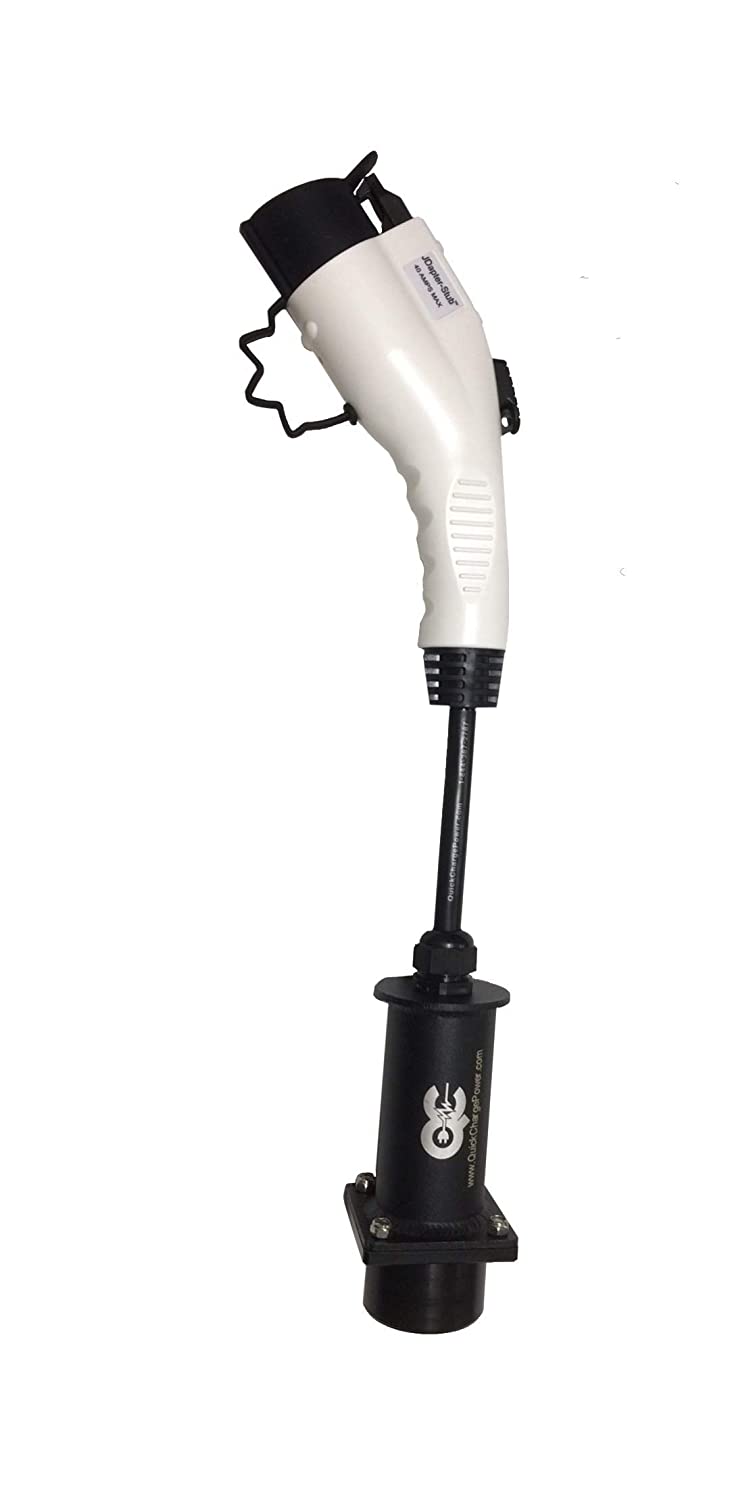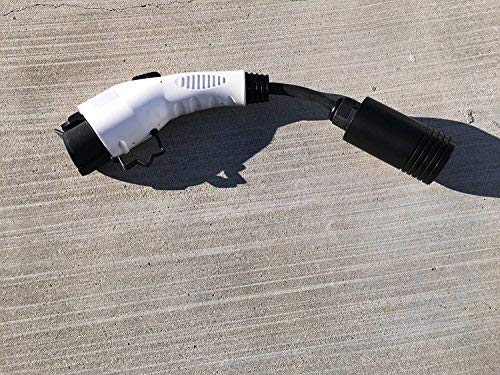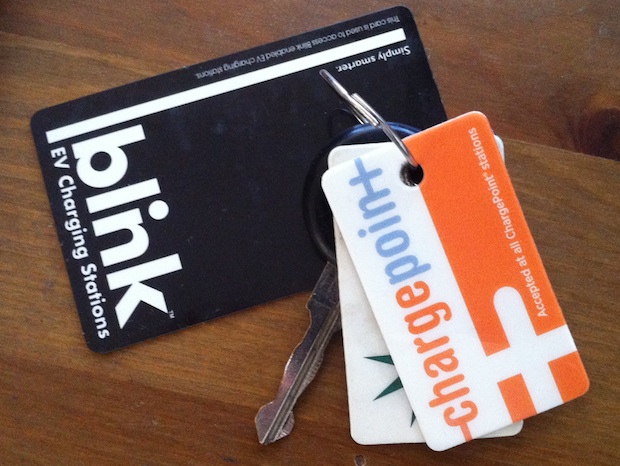Tesla Motors electric cars use a proprietary charging plug. Adapters are available from Tesla Motors allowing owners of their cars to use public charging stations built with standard charging plugs (J1772, Mennekes, CHAdeMO). Tesla Motors is also deploying charging stations, both fast charging and destination charging, to locations around the world that are meant to support owners of Tesla Motors’ cars.
Because these charging stations use a proprietary plug, owners of other kinds of electric cars cannot use the charging stations built by Tesla Motors. It is Tesla’s choice to do this, resulting in a duplication of effort as parallel charging infrastructure is built. Tesla Motors is building their proprietary charging infrastructure, and a cluster of other companies are building charging infrastructure using standardized (non-proprietary) charging plugs.
To an extent this is all fine – Tesla Motors and their customers are choosing what they’re choosing, and they have every right to do so. However, it also means that owners of Tesla’s cars can use the non-proprietary standardized charging network, but it’s not a two-way-street. Those of us with cars with the non-proprietary standardized charging plugs cannot use a Tesla charging station.
Or, can we?
UPDATE: This article was originally written in November 2015 and covered a prototype adapter allowing a J1772 car to charge at a Tesla HPWC station. At the time we thought nobody would ever make a product for sale.
As of March 2019 at least two companies are selling Tesla HPWC/UMC/DestinationCharger to J1772 adapters as products. With these adapters the whole Tesla Destination Charger network becomes available.


END UPDATE
J1772 adapter for Tesla HPWC stations
This video shows a BMW i3 connected to a Tesla Motors HPWC charging station (HPWC === High Power Wall Charger). Normally a J-1772 car cannot do this, because no adapter exists for this combination.
An adapter letting a Tesla car charge off J1772 stations does exist. What doesn’t exist is an adapter for the other direction. Well, except, this video does show such an adapter.
Let’s be clear since there is some confusion:
- This adapter supports Level 2 AC charging, not DC Fast Charging.
- This adapter would work for any car with a J1772 port, not just the BMW i3.
- This is a prototype unit, and in the comments over on YouTube the fellow makes it clear it’s still in development.
- That this video is shot in front of a Tesla Store indicates he had to have made some kind of agreement with the store manager to do this.
That last point refers to a sticky issue if one gets pretty pedantic about who’s paying for what, and whether this video constitutes evidence of theft from Tesla Motors.
Tesla built and installed that charging station on their property, that’s pretty clear. It has a sign saying those charging stations are solely for owners of Tesla’s automobiles. The BMW i3 owner may or may not have gotten permission from the store manager.
Tesla’s proprietary HPWC charging network
Tesla Motors has shipped HPWC stations out to hundreds of destination locations – hotels, restaurants, etc – over the last couple years. Go to the PlugShare website or smart phone app, set the filters to show HPWC stations, and browse around. The HPWC network is extensive, and seems to fill in gaps in Tesla’s Supercharger network. Tesla Motors hasn’t said publicly (to my knowledge) whether the company is bearing the whole cost for the public HPWC charging network, or whether host sites are bearing some of the cost.
At an HPWC charging station, who pays the cost for the charging session?
These stations have no built-in capability to charge a fee for a charging session. No credit card swiper, etc. The way Tesla Motors has ensured the HPWC network is only used by Tesla Motors customers is via the proprietary charging plug. But a freely purchasable adapter, like we see in this video, would upturn that assumption.
If this adapter is purchasable by the public, there could be tens of thousands of electric car owners wanting to buy one. There might be a feeding frenzy of non-Tesla EV owners descending upon Tesla’s network of proprietary HPWC charging stations.
“Theirs” and “Ours”
Those of us with non-Tesla cars may say “turnabout is fair play”. Model S car owners have been using “our” charging infrastructure for years, but we haven’t been able to use “theirs”.
Is it “fair play”? Or would we be stealing from Tesla Motors by having such an adapter? And, isn’t there a problem with the “theirs” versus “ours” mentality?
The real problem isn’t whether we’d be stealing from Tesla Motors. Instead it’s the parallel charging infrastructure being built by the companies involved.
- J1772 Level 2 charging stations aren’t equally available to all EV owners.
- There are many ways access is limited – some stations are “employee only”, others locked down to members of specific charging networks, some are operated by car dealerships who prevent open access, etc
- Multiple incompatible DC fast charge protocols (CHAdeMO, CCS, SuperCharger, etc)
- Incompatible Tesla-proprietary charging plug and charging network
What if the companies building charging infrastructure were to jointly work together to build a system that’s open to all electric car owners? There would be no “theirs” versus “ours”, because it would all be “ours”.
The Network Effect
There’s a business model called “The Network Effect” which says the value of a “network” increases with the number of connections to that network. Meaning that the public electric car charging network would be made more valuable the more people that could use it.
Instead, we have a hodgepodge of charging networks that don’t form a cohesive whole. Instead they act like independent fiefdom’s that throw up access barriers around their charging stations. The symptom of the problem is that we must make membership relationships with all our local charging networks.
Multiple membership cards is a problem, not a solution.
Do we have this problem when driving a gasoline powered car? Nope. Buying gasoline is as simple as a credit card swipe or paying cash. The network of gasoline stations is open to all car owners, and is therefore much more valuable than if the gasoline stations were branded to specific car manufacturers who installed proprietary fueling ports.
- The USA should delete Musk from power, Instead of deleting whole agencies as he demands - February 14, 2025
- Elon Musk, fiduciary duties, his six companies PLUS his political activities - February 10, 2025
- Is there enough Grid Capacity for Hydrogen Fuel Cell or Battery Electric cars? - April 23, 2023
- Is Tesla finagling to grab federal NEVI dollars for Supercharger network? - November 15, 2022
- Tesla announces the North American Charging Standard charging connector - November 11, 2022
- Lightning Motorcycles adopts Silicon battery, 5 minute charge time gives 135 miles range - November 9, 2022
- Tesla Autopilot under US Dept of Transportation scrutiny - June 13, 2022
- Spectacular CNG bus fire misrepresented as EV bus fire - April 21, 2022
- Moldova, Ukraine, Georgia, Russia, and the European Energy Crisis - December 21, 2021
- Li-Bridge leading the USA across lithium battery chasm - October 29, 2021





















Are these for sale anywhere?
Click through to the youtube video – they appear to be under R&D
You can find them for sale at http://umc-j1772.com
I currently drive an i3, and don’t have many public charging options where I live. That’s not really the point though. This is theft, plain and simple. Taking something without permission and not paying for it, you can’t justify it or call it anything else.
Perhaps impractical due to political / proprietary issues but it should be possible to have a vehicle identifier in the handshake data stream and if the vehicle owner has subscribed they would receive a bill / credit card charge, if not no juice for you.
I don’t see why Musk or Tesla would have a problem with other cars using HPWCs since Musk has been saying for years that he wants to encourage the spread of EVs, from any maker, not just Tesla. And didn’t he also say he was making the Tesla patent portfolio available without license?
Yes, all that’s happened. For the Supercharger’s he’s said that Tesla is open to other automakers licensing the technology and buying into the system — only if they pony up a fair share of the costs. It doesn’t pay Tesla to spend $$’s building infrastructure to see others use it for free.
Pingback: Tesla Doing Recall Safety Checks at Supercharging Locations | CleanTechnica
Tesla, Nissan, Ford, BWM, Mitsubishi and Kia all market BEVs. Where is the proactivity? Toyota, GM, and others sell PHEVs….
Shortsightedness throughout indeed- and you must include the utilities in the fray… 10 years ago, if you approached a large utility about charging stations they wouldn’t take your phone call. So here we are left with this conundrum, Because nobody with the finances and connections saw this as a problem 10 years ago.
So what is the problem? The guy may have stolen $0.50 worth of electricity making this video, or maybe he had permission from the Tesla service center, Tesla has Video proof if they want to sue this guy for the offense. Not the worst offense committed on a You tube video. Tesla makes and sells CHAdeMO adapters that can be used to charge Tesla’s at Nissan dealerships. Why can’t this guy sell an adapter that allows someone to charge a Nissan at a Tesla Service center, I suspect a desperate Tesla driver has pulled up to a Nissan Dealership’s CHAdeMO charger and plugged in with out permission . These CHAdeMO adapters can also be used legally at public CHAdeMO chargers. TESLA also provides a suit case of adapters to allow Tesla’s to charge from many other power sources, legally or not. HPWC are provided to end locations to encourage Tesla travel, They are provided under some agreement between Tesla and the receiving business. It is the receiver of the HPWC who should enforce this use agreement between them and Tesla.. No one else knowns what the agreement is. The agreement may not even limit use by non Tesla cars. Far more HPWC have been purchased by Tesla owners then Tesla has provided to destination charging. Tesla owners do not have any restrictions on the use of their HPWC. The Tesla owners certainly have the right to allow an adapter to be connected to their HPWC. Car charging should only be done with the authorization of the charging provider. Use of this J1772 to HPWC adapter is no different then all the other charging options available. Just get permission before you charge.
Apparently this is Salt Lake, where they have j1772 plugs free to use. So not theft of electricity.
With the recent updates to the HPWC allowing daisychaining/smart charging on limited circuits, this adapter opens HPWC to becoming the go-to EVSE for everyone. Very exciting!
Sure, some get their panties in a twist, theyd like to protect their imaginary walled garden. Fact is, Tesla could easily have made these chargers so they’d only work with Teslas, they didn’t. Given the depth of first principles design this is likely intentional rather then accidental.
Sure some people feel uncontrollable desire to protect their “entitlements” whether perceived or real.
Comes from a narrow, ungenerous, unimaginative scarcity worldview. Fortunately, that’s not the worldview Elon takes.
I’m not sure I see the “theft” here. Many of the Tesla Destination chargers are set up as businesses, as a means of drawing Tesla drivers to the business. That said, nothing stops a Tesla owner from plugging in at a destination charger, and using the business across the street. So, if you pull up in an i3, and use this adapter to shop at the business who hosts the charger, does that not achieve the same goal?
Also, Tesla opened all their patents, including Superchargers and the plugs, with no royalties and are free to use, with the mission of expanding EV adoption. So, if an enterprising individual sells one of these adapters, is that not also achieving Tesla’s cause?
Also to add, Tesla Roadsters used J1772 plugs, so this would allow a Tesla to use Tesla plugs!
Patents are not sufficient to implement the system. For the Supercharger system, Elon Musk et al have said they’re open to other car companies to work with them so long as those car companies are willing to pay into building the Supercharger system.
Considering that as taxpayers you have contributed over $4 billion dollars of government subsidies and tax breaks to Tesla are you stealing from him or are they benefiting from us and not letting us use the plugs we paid for?
The “$4 billion” figure is highly suspicious. For example, Tesla Motors received about $420 MILLION in a Dept of Energy LOAN program, which Tesla Motors repaid in full and more quickly than required. There are tax breaks the company has received for various factories it is building. The Gigafactory being the primary example. How is it any different for Tesla Motors to receive that kind of tax break versus any other company that receives similar tax breaks. Governments are giving that kind of “incentive” to businesses all the time.
ebay has a seller search: tesla j1772 $200-300
Are you sure? What shows up for me is a couple listings for Tesla’s adapter allowing Model S/X folk use J1772 EVSE’s. That’s the opposite direction of the adapter shown above.
oh.. wait … “Female Tesla compatible connector – J1772 – UMC – EV” … that’s the thing … requires some DIY work … Hurm
Also available from http://umc-j1772.com directly.
Yes there is a DIY for $180 and a complete unit for $300
Female Tesla compatible connector – J1772 – UMC – EV
and
Tesla compatible UMC to J1772 conversion Cable by the same seller winmedic